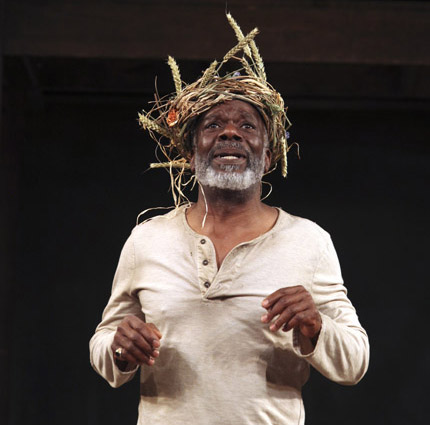‘When we are born, we cry that we are come to this great stage of fools’
George Bernard Shaw wrote ‘no man will ever write a better tragedy than Lear’, with cruelty, suffering, disloyalty, promiscuousness and a touch of acerbic wit, it stands the test of time and compares favourably to any contemporary soap opera or drama and where better to see Shakespeare’s iconic male part of ‘Mad’ King Lear than amongst the hallowed stones of Oxford’s Bodleian Library.
In collaboration with The Oxford Playhouse and The Bodleian Library, The Globe Theatre on Tour present a twelve-day run of Shakespeare’s epic tragedy King Lear, in the midst of the Jacobean Old School Quadrangle of the Bodleian. Bill Buckhurst’s production is set on an Elizabethan booth-style stage with sparse decorations or props and stars Joseph Marcell, most commonly known to the 1990s generation who watched the sitcom The Fresh Prince of Bel-Air as the sardonic butler Geoffrey.
The aged monarch King Lear, tired and fed-up of his royal duties, proposes to divide his Kingdom between his three daughters. To do this he decides to allocate parts of the kingdom dependant on their avowals of love for him. Cordelia, his youngest and favourite daughter, seeing the barbarity and shallowness of such a proposal remains silent – enraged by this refusal to speak, Lear cruelly disinherits and banishes her – an event that eventually will lead to his downfall.
Lear is a role that most serious actors crave to play, and has included the likes of Ian McKellen, Laurence Olivier, Derek Jacobi and Michael Gambon but to name a few. Marcell’s portrayal is stupendous – stripped back to its simplest form, it is touching, humble and believable. His descent into madness is not overdone but powerful, and is an example of Shakespearean acting at its best. Moreover although a tragedy, the cast of eight managed to extract considerable humour from the script which lighten the mood and made it widely enjoyable for a diverse audience. However, this in itself was a double-edged sword as the play loses a degree of its power, emotiveness and aura as a great Shakespearean tragedy which it should convey. This was particularly notable in the final act.
Nevertheless, the setting lends itself to such a production and it works successfully because it is imaginative, is played at just the right tempo and as a play it has been stripped back to its bare necessities which allows it to speak for itself. Never a truer word could be said than what a tragedy it would be to miss this spectacle. On a warm summer’s evening what a delight! ★★★★☆ Philip Smith


